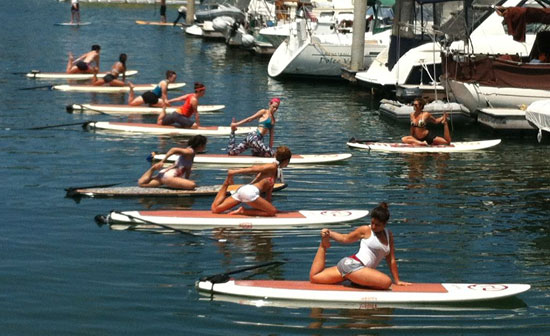Group swim meetup? Better get an OK
June 6, 2013
For the L.A. Tri Club, a Santa Monica-based triathletes organization, there are few better places to train for their running, swimming and bicycling contests than Malibu’s Zuma Beach.
But last summer, they hit choppy waters.
“A member was posting on our website, saying ‘I’m going to swim on Saturday at 8 a.m., come along,” club president Paul Hekimian remembers. “But when we got out there, the lifeguards were saying we needed to pull a permit.”
The problem? Thanks to the power of social networking, there was a crowd in the ocean—a phenomenon that has been happening with ever greater frequency.
“It’s something we’ve seen for a while on the land, with people who train for marathons and so forth,” says Kerry Silverstrom, chief deputy director of the Los Angeles County Department of Beaches and Harbors. “But now we’re seeing it more and more with organized water activity.
“We want to make sure that we know when these groups are coming, so they don’t interfere with ordinary beach access or something we’ve scheduled, and so we can make sure that they’re safe.”
That’s why the Board of Supervisors this week made some adjustments to the county’s policy on beach permits for organized summer activities at county owned or operated beaches, stretching from Nicholas Canyon above Malibu to White Point/Royal Palms beach along the Palos Verde penninsula. The only exemptions are for city-managed beaches in Santa Monica and Hermosa.
In years past, the only organized, regularly occurring activities allowed during the busy summer beach season were those conducted during business hours on weekdays by groups such as surf or day camps that bid on specific locations as part of a competitive process. Others—such as, say, big groups of swimmers who wanted to work out together—typically were denied summer permits by Beaches and Harbors or turned away if authorities caught them, even when the beach was less busy.
But in the last couple of years, Silverstrom says, demand from water sports enthusiasts and fitness groups have intensified to the point that the department decided to expand its policy. Permits will now be available for regular gatherings of groups such as swim clubs, triathlete teams and paddleboard meetups, as well as for organized summer recreation in the early mornings and evenings.
But the new rules come with a cost that’s unlikely to put some applicants in a sunny mood.
Like other groups now using the beach, they’ll have to pay a $200 administrative fee (click here for an online application), produce proof of liability insurance and reimburse the county for the cost—about $50 an hour, on average—of any extra lifeguards.
There is no size threshold for water activity groups, partly, officials say, because most of the water-based crowds have sprung from social networks, which tend to produce a variable turnout.
“Someone on Facebook will want to meet up for yoga on paddleboards, and one week 12 people will show up, and the next week there’ll be two,” says Beaches and Harbors spokeswoman Carol Baker. “But whatever the size, if something happens, the lifeguards are the first responders and have to know who’s out there.”
The fine-tuning comes two years after an overhaul of Beaches and Harbor’s permitting system, which is only now being rigorously enforced as grace periods have ended and a team of code enforcement officers has come online.
Beach users have mixed reactions. The off-peak permit decision delighted Sarah Tiefenthaler, whose standup paddleboard yoga class, YOGAqua, had to move this summer because she lacked a permit to continue operating in Marina Del Rey on weekends.
“It’s wonderful to hear that there’s even a glimmer of hope,” Tiefenthaler says, adding that if she can get back into her old Mothers Beach location, she won’t mind the permit fees.
Meetup groups are less sanguine, however.
“I think this is murky,” says Hekimian of L.A. Tri Club. Though scofflaws can be fined from $100 to $500 for gathering without a permit, he notes, social networks like his have no clear lines of responsibility.
“It’s like a member of Facebook saying, ‘I’m going for a workout, who wants to join me?’” he says. “If that member doesn’t get a permit, who gets the bill? Facebook?”
Beaches and Harbors officials say that no group gathers en masse unless someone’s organized it, and that they don’t care who pays as long as someone gets a permit.
“When 30 people jump in the water for a swim at seven in the morning, it’s really important that lifeguards be there,” says Baker, who adds that “some of these meetup groups say they’re not organized and then you go online and see that they are.”
As the new rules settle in, eight code enforcement officers will be patrolling the beach this summer with an eye out for groups that appear to be organized.
“We’ll issue them a flyer the first time we meet them, and tell them that if they’re conducting a business or an organized activity, they need a permit,” says Vivian Sanner, who is handling beach code enforcement at the department.
“If they say, ‘No, we’re just a bunch of friends,’ we’ll let it go the first time. But if we see them again, same time, same place, we won’t be as nice.”
Posted 6/6/13














 405 bridge work causes a stink
405 bridge work causes a stink
